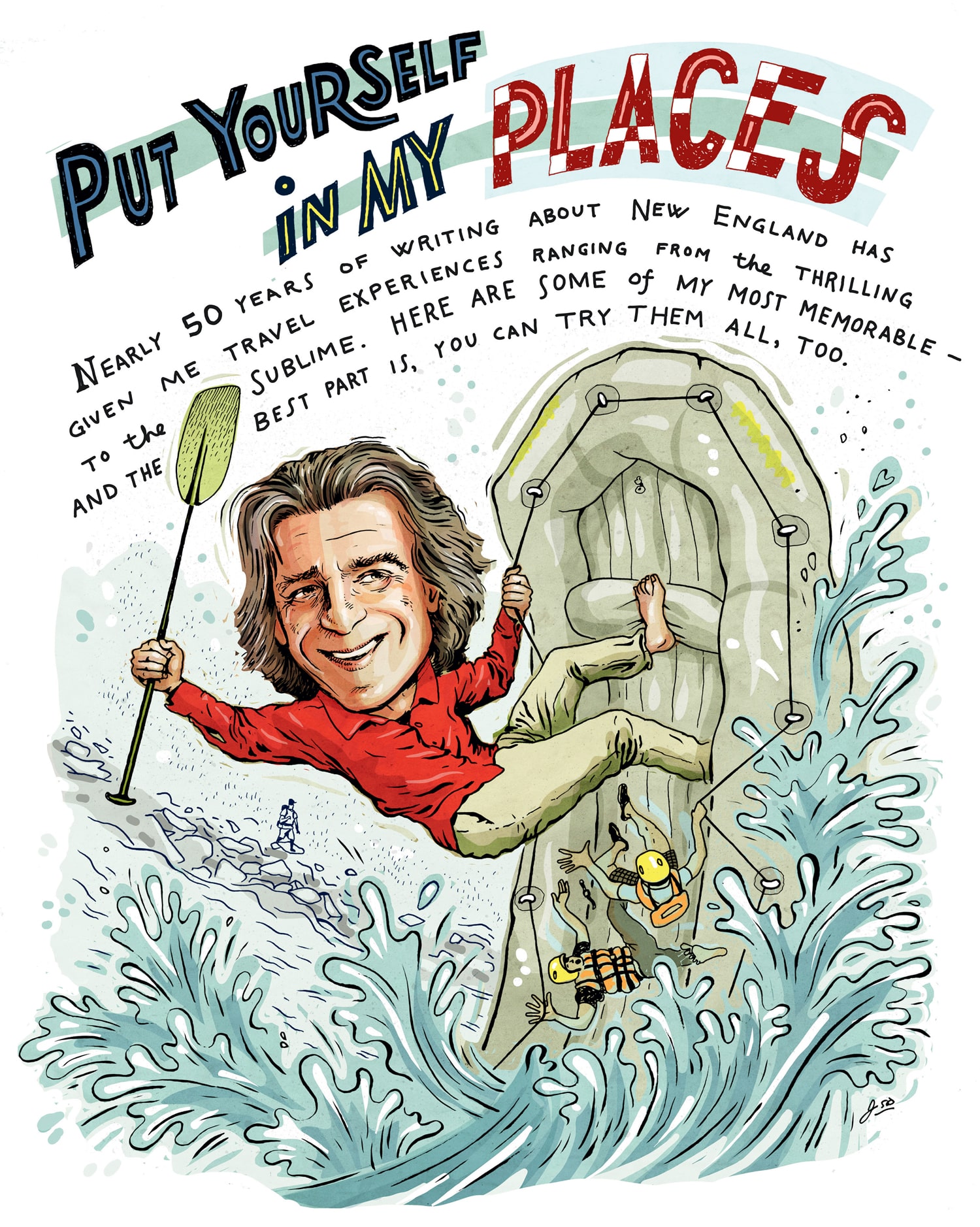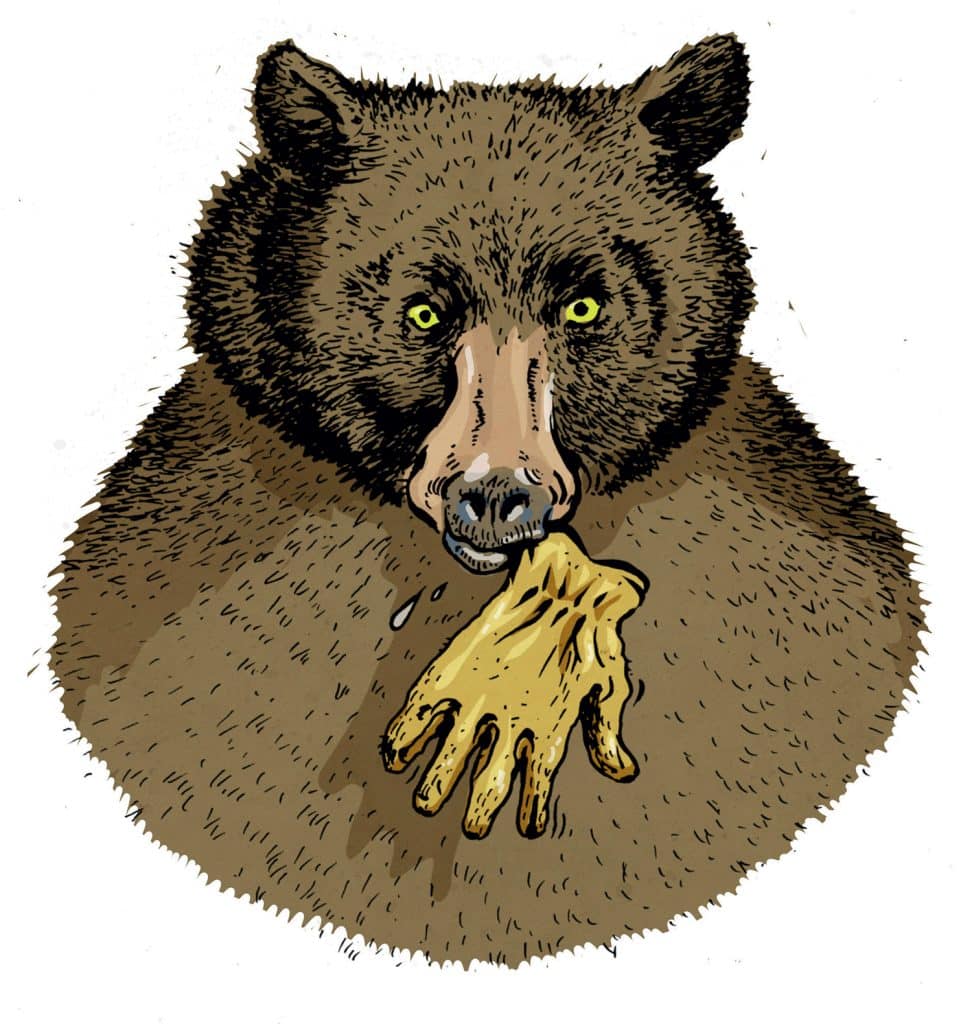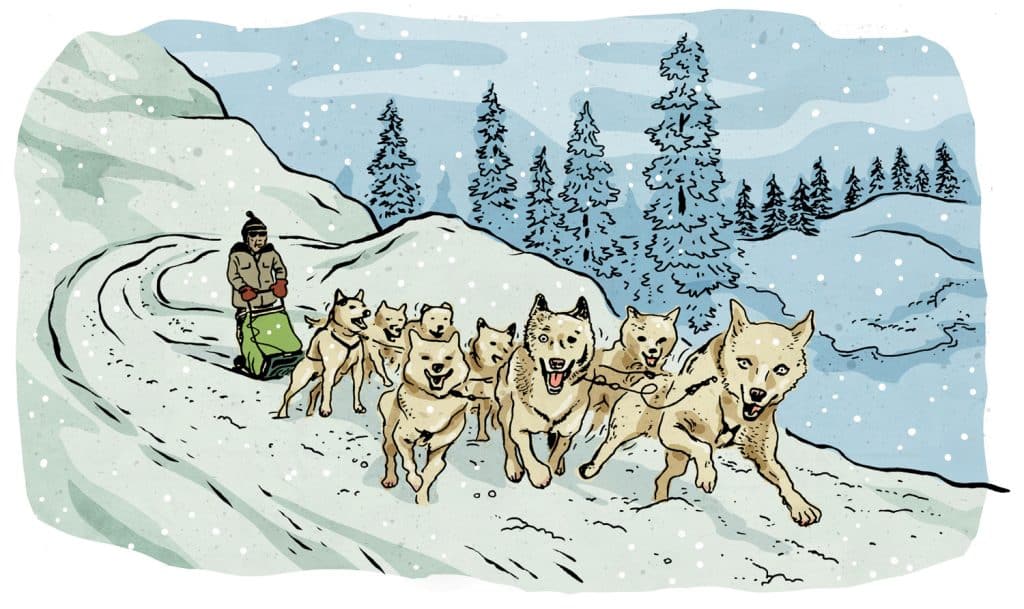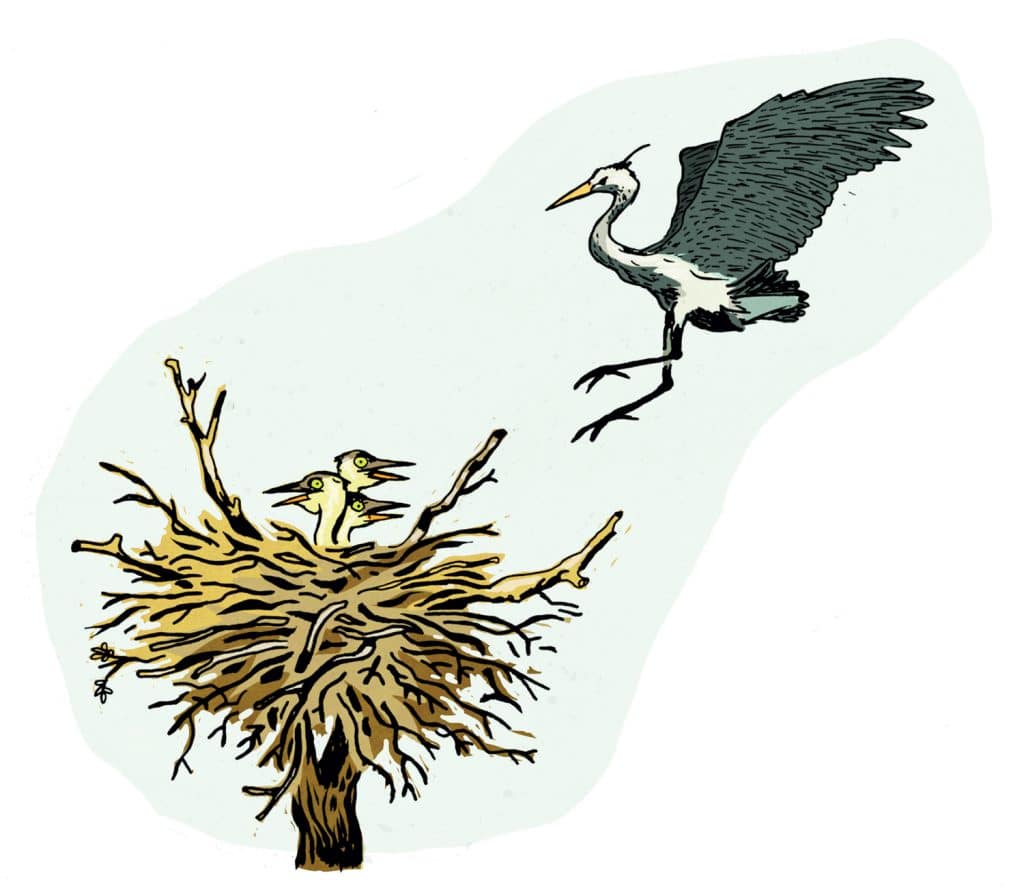Put Yourself in My Places | Reflections on Nearly Fifty Years at Yankee
Nearly 50 years of writing about New England has given editor Mel Allen travel experiences ranging from the thrilling to the sublime. Here are some of his most memorable—and the best part is, you can try them all, too.

My Yankee life began in 1977 when I lived in an unheated cabin on the shores of Keoka Lake in Waterford, Maine, a village with a pretty town green and historic houses bordered by stone walls. I had no running water—the owner having drained the pipes before he left in late fall—so on winter mornings I chopped a hole in the frozen lake and carried buckets of clear, very cold water to the cabin, where I heated it on the always-stoked woodstove. I lived at one end of the lake, and, after writing all morning, I would walk across the ice to visit with Alice Rounds, the postmistress and owner of L.R. Rounds General Store, the village’s social hub. The store was separated from the post office by short swinging doors, and Alice’s cry, “I’ll be right there!” bounced back and forth between the two. I had never sent stories to magazines before that year, and whenever I delivered something I’d written into her hands, Alice would wish it a fruitful journey. In a Maine village where locals took their time warming up to newcomers, she skipped the preliminaries and became a friend.
I tell you this because one of those stories had landed at Yankee. It was published in the October 1977 issue, my first byline in this magazine. I wrote about Waterford—the lake, a scenic mountain hike, orchards, a gem of a restaurant, and worthy sites overlooked by most travelers. The story ran without photos. Only black type on white paper. Yet within a few days of Yankee’s arrival in their mailboxes, readers came to Waterford to see for themselves. A local cidermaker told me people brought their copy and asked for his autograph. The chef-owner of the small French restaurant said he was taking reservations for days. Alice’s store had never seen so many new people at one time. Yankee had said, Here is what you can see and do here. And so they came.
I never forgot that trust that readers have in us. So, in setting out to describe my most unforgettable places and experiences over these past decades, I combed through memories as if choosing from hundreds of family photos, knowing I can frame only a precious few. What exactly sears a place into memory is undefinable. It may be the power of a beautiful landscape or the exhilaration of a risky adventure; sometimes, it’s simply the people I met whose stories touched me. And in making my choices, I wanted to be sure that these experiences are still out there today—for you, the readers, who may be looking to make memories of your own.
* * * *
Perhaps because I was raised as far from wilderness as you can imagine, I sought stories in places so remote that sometimes you needed a bush pilot to get there. No wonder I was drawn to the North Woods of Maine. If you have never set foot in Chesuncook Village…or canoed on the West Branch of the Penobscot River, where moose browse in the shallows…or had a Registered Maine Guide take you miles out onto West Grand Lake…or traveled to the end of the road in Allagash Village, you may not know how far the cry of coyotes can carry, how close the stars can seem on New England’s darkest nights.
One winter when my son Dan was still a baby, I strapped him onto my lap in a floatplane that took off from Moosehead Lake. We soon put down on the ice of Chamberlain Lake. That’s where I found Patty Nugent and her Nugent’s Camps, one of the most famous sporting camps in the state. Patty, then 81, met us with a snowmobile and a “driver” to carry us through deep snow to the cabins that she and her husband, Al, had carved from the forest 50 years earlier. And over the next four days, while baby Dan was passed hand to hand among the small winter staff like a puppy, Patty told me their story.
It began in the summer of 1936, when Patty and Al stowed all their belongings on a handmade raft and paddled across Chamberlain Lake until they reached its eastern shore. This was back when you could stake claim to wild lands, and they had planned to build a sporting camp for fishermen and hunters. She told me about how they found the perfect location as if the memory had been preserved under glass for her to admire the rest of her life.
“We started up the lake in a canoe, looking for a campsite,” she said. “Went up one side, came down the other. I looked across and saw a little green knoll. Nuge said it was located where the prevailing wind would keep the flies away. He put his arm on my shoulder and said, ‘Just right, little girl. This is just right.’” Years later, after the Nugents had gained national fame for their sporting camp, Al died of a heart attack while clearing wood. Patty put a stone on his grave with the words “Just Right.”
At the end of the four days, Patty bid us good-bye as we waited for the float plane to pick us up. And I can still hear her parting words: “I’d give everything back in a minute for just one night to do over. The night me and Nuge pushed off and floated so slow up the lake, and in the dawn I looked across and saw that little green knoll.”
* * * *
If I could have chosen where I’d want to be when a mama black bear bit me, it would’ve been right where I was: in the snowy depths of Baxter State Park, alongside Maine’s black bear biologist. The park’s 200,000-plus acres are the most revered stretch of wilderness in New England, and to me the grandest place to step away from the comforts of daily life. (If you don’t know Baxter, look on a state map for the big green patch about 85 miles north of Bangor.) Former governor Percival Baxter spent more than 30 years buying up these mountains, rivers, lakes, and dense forests before giving it all to the people of Maine to be kept “forever wild.”

The biologist was crawling into the dens of bears he had radio-collared months earlier. His task was to monitor how they were faring. I crawled in after him to watch as he jabbed a tranquilizer dart into one mother, her cubs snugged up against her; he would need her to stay docile as he took each youngster outside the den to weigh and measure it. I’ll never forget the dank closeness of that space, or the life lesson I learned not long after exiting it: When a bear biologist hands you a net to drape across a den to ensure mother and babies stay separated, remember to ask, Are you sure you gave her enough tranquilizer? This particular bear, protecting her home, erupted from the den. A clamped jaw on my gloved hand and then my leg revealed her raw power, even though she had not eaten for months. It was worth the follow-up tetanus shot to always keep the memory of a bear living a life “forever wild” in the flesh.
The beauty of the New England coast rivals any in the world. After sailing Maine’s Penobscot Bay on a windjammer, I wrote about the tight quarters and the need for nighttime earplugs to dampen fellow passengers’ snores—yet also about the intimacy that we felt with the bay and its islands, a feeling no ocean liner could ever give. I have witnessed sunsets around the world, but never one that could compare to when we anchored off a small island, color spreading so intensely across the sky that everyone fell silent.
And how do I choose one beach? I have walked Maine’s Popham Beach at low tide to Fox Island, then scampered back when the tide started to rise; ridden across the windswept dunes of the Cape Cod National Seashore; inhaled the solitude of Rhode Island’s Napatree Point. With New England’s hundreds of miles of beaches, I cannot explain why a barely half-mile stretch of sand eight miles south of Portland remains special to me, except I think Higgins Beach has always been where I’d want to live, looking out to the twinkling lights of Prouts Neck at night. It was here that I slept in my all-time favorite room: the Tower Room at The Breakers, a modest inn, as comfy as a favorite sweater, that’s been family-run since 1957. The room came with inconveniences (third floor, low ceiling), but its eight windows let in light and breeze, and the breaking of the waves sounded as clear as if I were lying on the sand. I awoke to the sunrise and settled before the windows in a rocking chair. There had been a storm, so the sea boomed. Just beyond a window, the flag waved. All the while I sat listening, almost as if waiting for the cry to hoist sails.
* * * *
One of the gifts that Yankee’s longtime editor, Jud Hale, gave me was his blessing to find adventures.I was only the second journalist to join Wayne Hockmeyer, Maine’s whitewater rafting pioneer, in plunging through the ferocious rapids of the Kennebec Gorge. I will always carry the mix of fear and adrenaline I felt when Hockmeyer told us, “A river gives no guarantees. If you are careless, you can go out.”
Eight years later I coaxed my sister, Anita, and her 12-year-old son, Adam, to join me. Anita was just a year older than me, but she was a city girl. To her, “outdoor adventure” meant a drive in the country. I told her about The Forks and its community of rafting companies with their lodges, hot tubs, and restaurants; I left out Magic Falls and its 12-foot drop, where the pressure on the raft can shoot you like a champagne cork into the waiting Kennebec.
Before we climbed into the raft, she grew quiet. “I’m not sure I can do this,” she told the guide. “I’m an indoor person.” The guide replied, “This is the outdoor adventure for indoor people.”
Right from the start, we were drenched by the river as the raft buckled and felt as if it were being sucked into a hole. Anita held on. When we pulled into shore, her face glowed. She promised to return—and not be fearful.
When Anita fell ill some years after, and we both knew the outcome, we would talk about all the things we had done together, from childhood to then. And we always found a way to laugh, remembering how no matter how afraid she had been, she had done it. And she had not wanted it to end.
* * * *
Of all my stories, the one with the most apt title was about my foray into sled dog racing: “The Worst 30 Minutes of My Entire Life.” The near-six-mile race was on Rangeley Lake, and just as my five-dog team was about to start, a blizzard flew at us out of nowhere.As the snow swirled, I watched the team ahead of me—whose driver, I had been assured, would look out for my team—disappear into the whiteout. The confidence I had gained from two days of training drained out of me, along with any sense of writerly adventure. Even now, I recall how my heart pounded as the dogs strained forward and the starter counted down, “Four, three, two, one….” I was conscious of two shouts before all noise faded into the wind. One was from the starter: “DON’T LET GO OF THE SLED!” And the other was from my dogs’ frantic owner: “WE MADE A MISTAKE!”

I did everything wrong that first day, including getting entangled with not one, but two other dog teams. But I somehow struggled to the finish line, and the second day, under blue sky, we raced along as if I had been doing it my whole life. For days afterward, I would return to those moments when we passed other teams, and the heads of the dogs would snap to the side, and sometimes there would be a low growl and a fleeting nip…and then we would be past.
* * * *
And still, more memories seem to speak: Tell them about me, they say.
How can I not include my winter weekend atop Mount Washington in the depths of winter, wind howling outside the weather observatory, the otherworldly rime ice coating the buildings, the feeling of how thin the line is between safety and peril in such harsh yet beautiful surroundings?
Or the summer night when I joined thousands of people along the banks where Providence’s rivers flow together to see the stunning WaterFire installation? Music cascaded all around, and fire tenders glided past, setting bonfires alight. Every molecule of my body seemed to absorb the sounds, the light, the smoke rising from the water.
Or the day at Mystic Seaport when I climbed down into the hold of the Charles W. Morgan, the last surviving wooden whaling ship, and felt what it must have been like to be a whaler, living at sea for months, even years, filling that hold with blubber and whale bones?
Or when the owner of the North Hero House in the Champlain Islands, one of my favorite places on earth, said he wanted to show me a place few of his guests ever saw? We turned off a dirt road just minutes from the inn, and suddenly the dusk sky was filled with a torrent of great blue herons coming home to roost, the sounds of their rookery making me feel as if I had wandered into a secret prehistoric society.

I want to end with my newest “forever” travel memory. In late October my wife, Annie, and I, along with Rudy, our old Jack Russell, spent a week on Cape Cod in a tiny shingled cottage in North Truro. The cottage was called Lil Rose, and in the mild ocean air, roses still bloomed. The beach stretched to Provincetown, and each morning we walked a mile or two before Rudy grew tired and I picked him up and carried him, his head resting on my hands. We then drove to P-town and took in the heady mix of people and shops and endless bicycles swerving in and out along the narrow streets. Each day ended at Race Point Beach. The sunsets there draw an audience every evening, but it was in the cool air of late afternoon that the seals bobbed past us, only a few feet away, diving through the waves. I watched them swim farther west until they vanished. I picked Rudy up, and as the sun began to set and the seals headed back to whatever bit of land they knew as their home, so, too, did we.
Mel Allen
Mel Allen is the fifth editor of Yankee Magazine since its beginning in 1935. His first byline in Yankee appeared in 1977 and he joined the staff in 1979 as a senior editor. Eventually he became executive editor and in the summer of 2006 became editor. During his career he has edited and written for every section of the magazine, including home, food, and travel, while his pursuit of long form story telling has always been vital to his mission as well. He has raced a sled dog team, crawled into the dens of black bears, fished with the legendary Ted Williams, profiled astronaut Alan Shephard, and stood beneath a battleship before it was launched. He also once helped author Stephen King round up his pigs for market, but that story is for another day. Mel taught fourth grade in Maine for three years and believes that his education as a writer began when he had to hold the attention of 29 children through months of Maine winters. He learned you had to grab their attention and hold it. After 12 years teaching magazine writing at the University of Massachusetts-Amherst, he now teaches in the MFA creative nonfiction program at Bay Path University in Longmeadow, Massachusetts. Like all editors, his greatest joy is finding new talent and bringing their work to light.
More by Mel Allen

